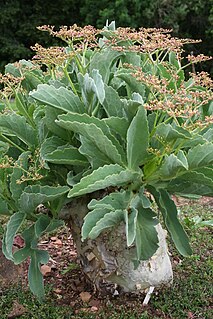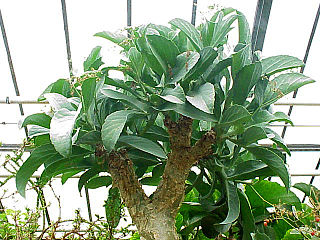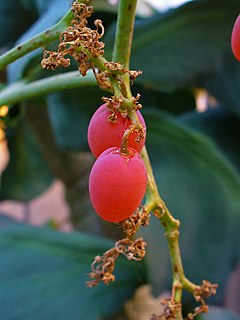
The Vitaceae are a family of flowering plants, with 14 genera and around 910 known species, including common plants such as grapevines and Virginia creeper. The family name is derived from the genus Vitis.

Southern Africa is the southernmost region of the African continent, variably defined by geography or geopolitics, and including several countries. The term southern Africa or Southern Africa, generally includes Angola, Botswana, Eswatini, Lesotho, Malawi, Mozambique, Namibia, South Africa, Zambia, and Zimbabwe, though Angola may be included in Central Africa and Malawi and Mozambique in East Africa. From a political perspective the region is said to be unipolar with South Africa as a first regional power.

Cissus is a genus of approximately 350 species of lianas in the grape family (Vitaceae). They have a cosmopolitan distribution, though the majority are to be found in the tropics.

Cyphostemma is a flowering plant genus in the family Vitaceae, with around 250 species distributed throughout the tropics and subtropics. These species are caudiciform and used to belong to the genus Cissus. The genus name comes from Greek kyphos, meaning hump, and stemma, meaning garland.

The Antebellum South was a period in the history of the Southern United States from the late 18th century until the start of the American Civil War in 1861. It was characterized by the rise of abolition and the gradual polarization of the country between abolitionists and supporters of slavery.

Cyphostemma juttae is a slow-growing succulent species of Cyphostemma from southern Africa, well known as an ornamental plant.

The University of Michigan Matthaei Botanical Gardens includes botanical gardens, natural areas with trails, and several research-quality habitats. The conservatory is popular year round. The public entrance is at 1800 North Dixboro Road in Ann Arbor, Michigan. The grounds are open every day, but trails are not maintained in the winter. The conservatory, garden store, and lobby are open 7 days a week: Mon., Tues., and Thurs. - Sun., 10:00 am–4:30 pm; Wednesdays 10 am-8 pm. The building complex is only closed on three holidays a year. The institution's main web site with updated information is Matthaei Botanical Gardens.

The genus Cayratia comprises approximately 45 species of plants, some of which have utility value to people. It is found in tropical and subtropical areas of Asia, Africa, Australia, and islands of the Pacific Ocean.

Pachycauls are plants with a disproportionately thick trunk for their height, and few branches. The word is derived from the Greek pachy- meaning thick or stout, and Latin caulis meaning the stem.

Cyphostemma currorii is a succulent tree belonging to the family Vitaceae and reaching a height of 6 meters or more. This plant is also known as cobas tree and butter tree. Cyphostemma currorii is found in hot, arid rocky places, and has been seen from southern Angola to Namibia and is common on the Brandberg.

Cyphostemma bainesii is a species of tree native to Namibia in Southern Africa. It grows up to 1 m (3 ft) in height, with green leaves up to 27 centimeters long by 11 wide. Mildly poisonous.

Ctenium is a genus of African and American plants in the grass family.

Odontoglossum cirrhosum, the wavy odontoglossum, is a species of orchid found from Colombia to Ecuador.

Cyphostemmin A is an oligostilbene found in Cyphostemma crotalarioides (Vitaceae). It is a resveratrol dimer.
Cyphostemma crotalarioides is a flowering plant species in the genus Cyphostemma found in Burkina Faso.

Cyphostemmin B is an oligostilbene found in Cyphostemma crotalarioides (Vitaceae). It is a resveratrol dimer.
Cyphostemma ternatum is a perennial climbing herb that grows up to 2m. It is edible and distributed throughout Northeast Africa to southern Arabia. ternatum in Latin means "arranged in threes" and alludes to the arrangement of the leaves.
Halas is a Yemeni food that is made of Ḥalaṣ leaf. The food is eaten during drought periods in Yemen.















